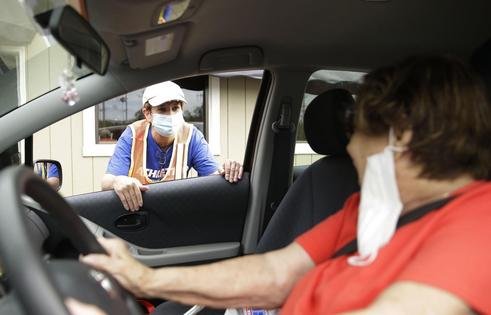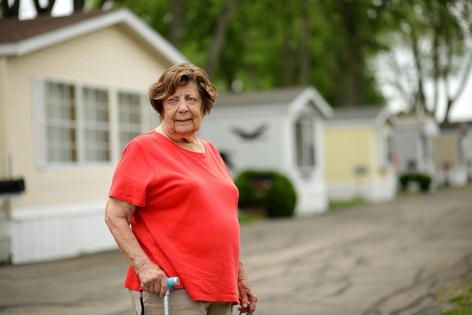Seniors, already at risk from COVID-19, face problems getting groceries and prescriptions
Published in Senior Living Features
CHICAGO - When she wants a break from being cooped up at home, Donna Langel, 80, drives through a Culver's near her home in Grayslake, Ill., gets takeout and eats lunch by the lake.
"I can watch people from my car," she said. "It's not that I'm just in four walls."
For months, she has stayed home. She has health issues her doctor said required a strict quarantine to stay safe from COVID-19.
And now, just as Illinois takes steps toward reopening, the recent looting means she and other senior citizens are staying home for a whole new reason.
"It's very scary," Langel said.
Even before Chicago was rocked by looting and destruction, senior citizens were struggling. Many have been isolated for months during the coronavirus crisis. Few people, if any, were able to visit. Routines were disrupted. No more shopping, lunches with friends or grandchild visits.
Now, in addition to isolation, they face a lack of access to necessities like prescriptions and groceries after businesses were looted or burned.
"They don't have any local grocery stores, the grocery stores are looted and they can't really get places," said Jahmal Cole, founder of My Block My Hood My City, which has been offering wellness checks and drop-offs for seniors. His group distributed 1,200 safety kits to senior citizens, filled with things like canned food and toilet paper. They have fielded similar requests from 2,600 seniors.
"We need volunteers," he said.
Simone Mitchell-Peterson, CEO of Little Brothers Friends of the Elderly's Chicago chapter, is worried about the mental health of the seniors the group serves. In March, she said, as the state began to shut down, many maintained a positive attitude. "As time went on, that began to morph into feeling bored, feeling anxious, feeling restlessness, sleeplessness, depression, anxiety."
Now, she said, the George Floyd response has created fear and resuscitated traumatic experiences in their own lives. Meanwhile, they wonder how they'll restock the pantry. With added anxiety and unrest, she said, "they're seeing themselves being on the inside again, looking out and, 'When do I get to do what I want to do?'"
Since March, Langel has Zoomed with her senior group, which used to meet once a month - "that way I get to see people, get news of whatever everybody's doing" - and she sometimes sets up chairs in her front yard to chat at a distance with whoever is nearby. But she misses her group lunches and outings to plays.
"We just can't go out and walk around the stores and be around people," Langel said. "Staying home is awful."
Even if restrictions lift, friends' health issues mean they are similarly isolated.
"We all are doing it because many of us have heart ailments or can't be around any other people," she said. "It gets harder, because you know when you first start, it's, 'OK, these things happen,' but then as it goes on longer you go, 'Come on.'"
Many who work with senior citizens have tried to help, offering video chats or other ways to connect. Typically, Little Friends volunteers check in regularly, bringing groceries and offering conversation and camaraderie.
"When you're at that later stage of your life, you don't mess around," Mitchell-Peterson said. "People are quick to form relationships and be engaged, and to engage others."
But the coronavirus limited social outings. After the lootings, many seniors are telling volunteers not to come, saying it's unsafe to visit, Mitchell-Peterson said. "They see us as friends, and they don't want to put their friends in harm's way."
Volunteers have stepped up to pick up prescriptions and deliver groceries. Kristin Kempiak, a Chicago teacher, spent an afternoon recently picking up groceries. A senior wasn't sure she could access her grocery store after looting, so Kempiak picked up groceries in another neighborhood and brought them to her door.
"I feel excited to be helping someone," she said.
She volunteered through Shopping Angels, which delivers groceries without a fee to seniors. It's partnered with Essential Supply, a nonprofit that connects volunteers with seniors and immunocompromised people. Right now, co-founder Luke deWilde said they have more volunteer requests than requests for assistance. They want to spread the word to elderly people who might benefit and can ask for help. Patrick Boyer, the Illinois coordinator for Shopping Angels, is also hoping to find sponsors to donate funds to provide groceries for those who have reached out and cannot afford them.
And it's not just groceries that seniors need; state Sen. Patricia Van Pelt helped organize a GoFundMe to raise funds for protective gear, like masks, as well as food and hand sanitizer, for seniors on the West Side. They also need containers to put donated sanitizer in.
Ronald Ross has skipped errands for months. As a 78-year-old with diabetes and high blood pressure and who has had two heart operations, he is "scared to death" of the store. He is so at risk that his wife took his keys. No more grocery shopping, no more twice-weekly bowling league.
It hit home when a man in his bowling league died of COVID-19, he said.
Now, the volunteer who drops off groceries is one of the few people he sees. Along with a weekly friendly face, he said, saving him from shopping kept him safe at home and, he added, "may have even saved my life."
Visit the Chicago Tribune at www.chicagotribune.com










Comments